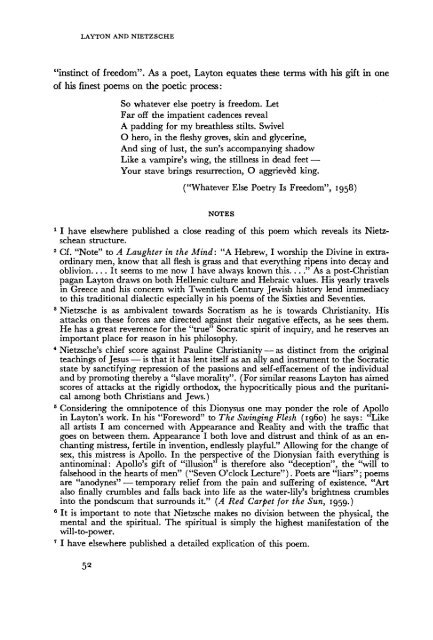LAYTON AND NIETZSCHE
LAYTON AND NIETZSCHE
LAYTON AND NIETZSCHE
You also want an ePaper? Increase the reach of your titles
YUMPU automatically turns print PDFs into web optimized ePapers that Google loves.
<strong>LAYTON</strong> <strong>AND</strong> <strong>NIETZSCHE</strong><br />
"instinct of freedom". As a poet, Layton equates these terms with his gift in one<br />
of his finest poems on the poetic process :<br />
So whatever else poetry is freedom. Let<br />
Far off the impatient cadences reveal<br />
A padding for my breathless stilts. Swivel<br />
О hero, in the fleshy groves, skin and glycerine,<br />
And sing of lust, the sun's accompanying shadow<br />
Like a vampire's wing, the stillness in dead feet —<br />
Your stave brings resurrection, О aggrieved king.<br />
("Whatever Else Poetry Is Freedom", 1958)<br />
NOTES<br />
1<br />
I have elsewhere published a close reading of this poem which reveals its Nietzschean<br />
structure.<br />
2<br />
Cf. "Note" to A Laughter in the Mind : "A Hebrew, I worship the Divine in extraordinary<br />
men, know that all flesh is grass and that everything ripens into decay and<br />
oblivion.... It seems to me now I have always known this...." As a post-Christian<br />
pagan Layton draws on both Hellenic culture and Hebraic values. His yearly travels<br />
in Greece and his concern with Twentieth Century Jewish history lend immediacy<br />
to this traditional dialectic especially in his poems of the Sixties and Seventies.<br />
3<br />
Nietzsche is as ambivalent towards Socratism as he is towards Christianity. His<br />
attacks on these forces are directed against their negative effects, as he sees them.<br />
He has a great reverence for the "true" Socratic spirit of inquiry, and he reserves an<br />
important place for reason in his philosophy.<br />
4<br />
Nietzsche's chief score against Pauline Christianity — as distinct from the original<br />
teachings of Jesus — is that it has lent itself as an ally and instrument to the Socratic<br />
state by sanctifying repression of the passions and self-effacement of the individual<br />
and by promoting thereby a "slave morality". (For similar reasons Layton has aimed<br />
scores of attacks at the rigidly orthodox, the hypocritically pious and the puritanical<br />
among both Christians and Jews. )<br />
5<br />
6<br />
7<br />
Considering the omnipotence of this Dionysus one may ponder the role of Apollo<br />
in Layton's work. In his "Foreword" to The Swinging Flesh (i960) he says: "Like<br />
all artists I am concerned with Appearance and Reality and with the traffic that<br />
goes on between them. Appearance I both love and distrust and think of as an enchanting<br />
mistress, fertile in invention, endlessly playful." Allowing for the change of<br />
sex, this mistress is Apollo. In the perspective of the Dionysian faith everything is<br />
antinominal: Apollo's gift of "illusion" is therefore also "deception", the "will to<br />
falsehood in the hearts of men" ("Seven O'clock Lecture"). Poets are "liars"; poems<br />
are "anodynes" — temporary relief from the pain and suffering of existence. "Art<br />
also finally crumbles and falls back into life as the water-lily's brightness crumbles<br />
into the pondscum that surrounds it." (A Red Carpet for the Sun, 1959.)<br />
It is important to note that Nietzsche makes no division between the physical, the<br />
mental and the spiritual. The spiritual is simply the highest manifestation of the<br />
will-to-power.<br />
I have elsewhere published a detailed explication of this poem.<br />
52

















